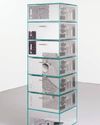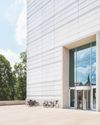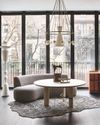Prøve GULL - Gratis
Found And Foraged
Metropolis Magazine
|November/December 2017
In the face of increasing environmental degradation and industrial waste, product designers turn to nature for innovative, subversive solutions.

It seems to have started with mushrooms. Recall the Living’s Young Architects Prize–winning pavilion at MoMA PS1 in 2014, for which architect David Benjamin created an igloo like structure in the museum’s courtyard, using 10,000 compostable mushroom bricks that each took a week to grow (and that carried a very faint scent, reminiscent to some of fermented soybeans). Still explored by young designers as architectural building materials, mycelia have in recent years been embraced by product designers as diverse and resilient components in lampshades, packaging, furniture, and even clothing. Mushroom-made designs may not yet be mainstream, but they are attractive to a younger generation of makers widening their approach to biodegradable materials.
Treading lightly on the environment, these concoctions re-imagine product design in ways that are not only sensible for our increasingly environmentally tragic times but also sensuous, offering tactile and narrative ruminations on the cyclical nature of life and death. The 20th-century ideal was to create mass-produced plastic and metal products that would last forever. By contrast, a new class of product designers places a premium on creating something ephemeral that decays gracefully, taking to nature-based materials like modern-day foragers, harvesters, and hunter-gatherers. Consider them design’s equivalent of the food world’s locavores or freegans, sticking it to the Man one material revolution at a time.

Denne historien er fra November/December 2017-utgaven av Metropolis Magazine.
Abonner på Magzter GOLD for å få tilgang til tusenvis av kuraterte premiumhistorier og over 9000 magasiner og aviser.
Allerede abonnent? Logg på
FLERE HISTORIER FRA Metropolis Magazine

Metropolis Magazine
No New Buildings
The energy already embodied in the built environment is a precious unnatural resource. It’s time to start treating it like one.
7 mins
November/December 2019

Metropolis Magazine
The Circular Office
Major manufacturers are exploring every avenue to close the loop on workplace furniture.
1 mins
November/December 2019

Metropolis Magazine
Signs of Life
Designers, curators, and entrepreneurs are scrambling to make sense of motherhood in a culture that’s often hostile to it.
7 mins
November/December 2019

Metropolis Magazine
Interspecies Ethic
In probing the relationship between humans and nature, two major exhibitions question the very foundations of design practice.
6 mins
November/December 2019

Metropolis Magazine
Building on Brand
The Bauhaus turned 100 this year, and a crop of museum buildings sprang up for the celebration.
8 mins
November/December 2019

Metropolis Magazine
Building for Tomorrow, Today
Radical change in the building industry is desperately needed. And it cannot happen without the building trades.
6 mins
November/December 2019

Metropolis Magazine
Strength from Within
Maggie’s Centres, the service-focused cancer support network, eschews clinical design to arm patients in their fight for life.
5 mins
October 2019

Metropolis Magazine
Next-Level Living
The availability of attractive, hospitality-grade products on the market means everyday consumers can live the high life at home.
1 mins
October 2019

Metropolis Magazine
Mi Casa, Su Casa
Casa Perfect creates a memorable shopping experience in lavish private homes.
1 min
October 2019

Metropolis Magazine
Enter The Culinarium
AvroKO imagines the future of residential amenities—where convenience, comfort, and sustainability meet.
5 mins
October 2019
Translate
Change font size
